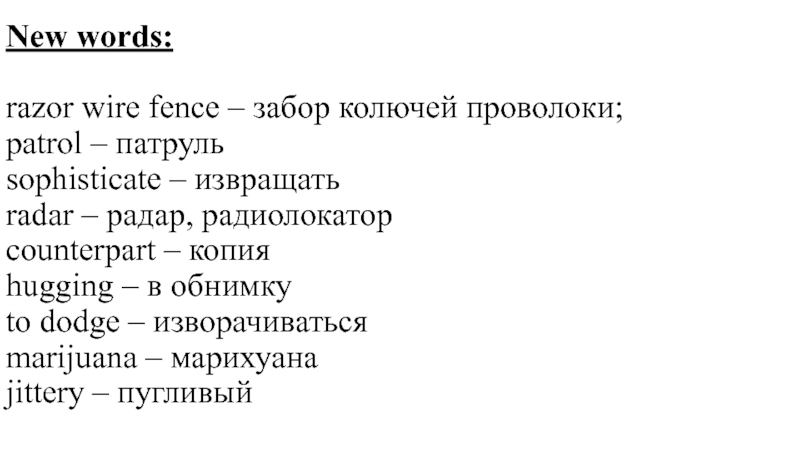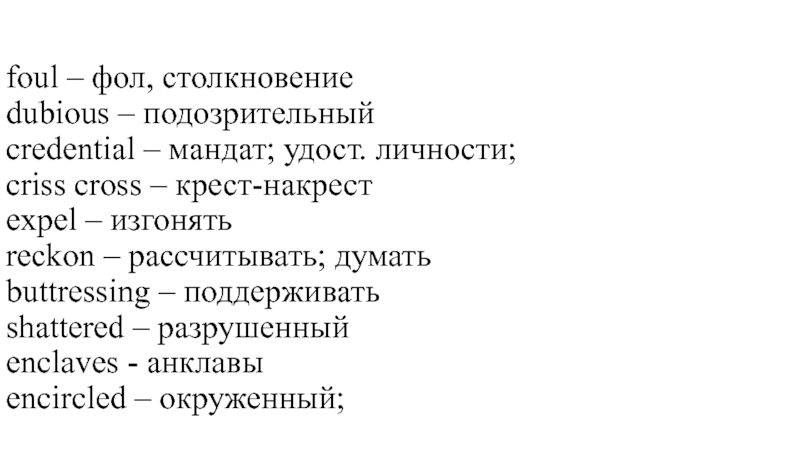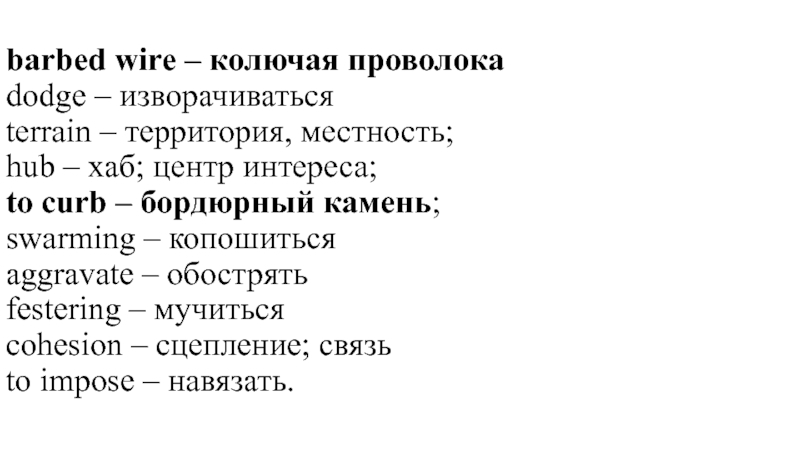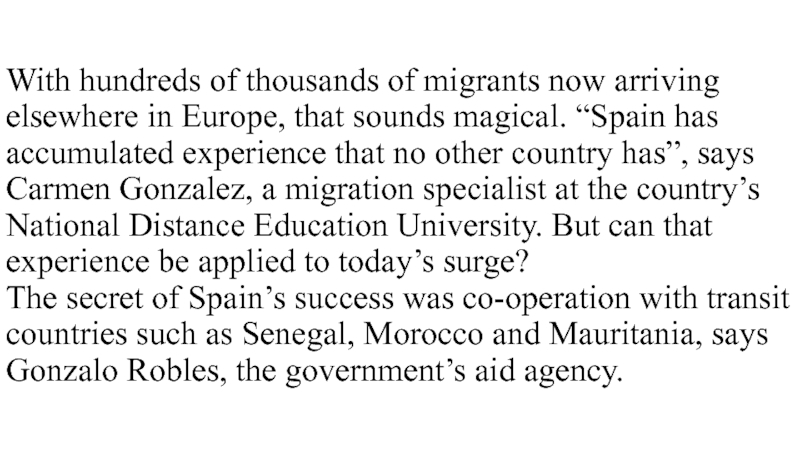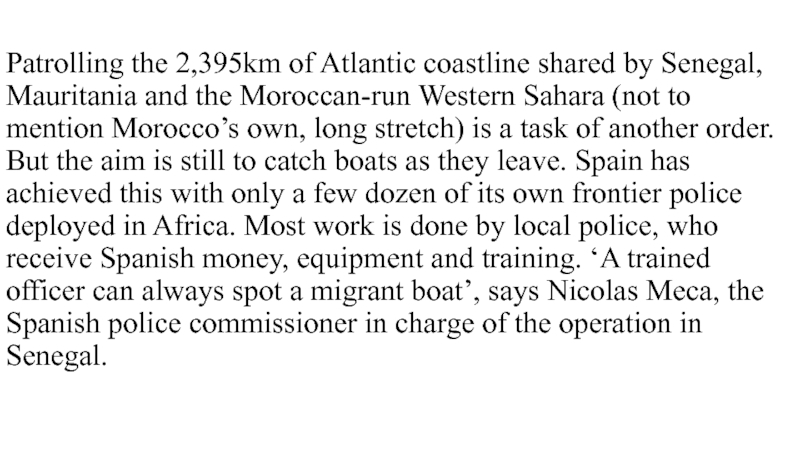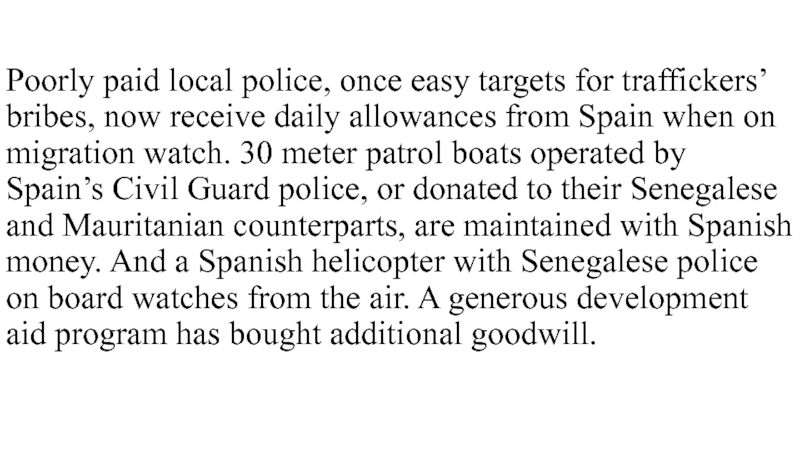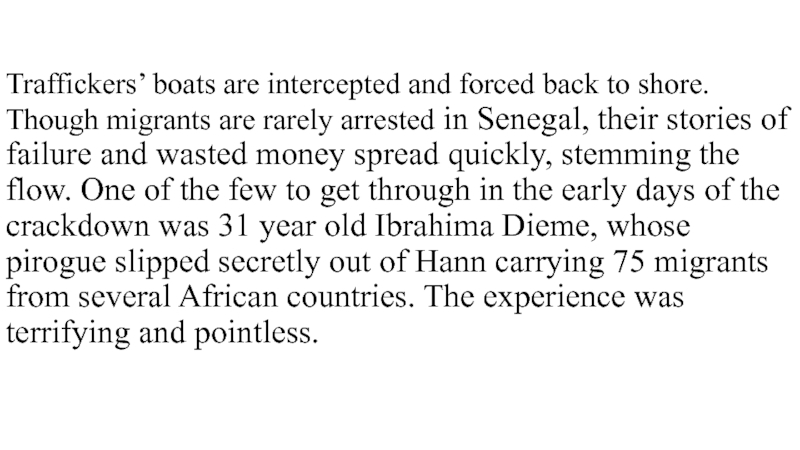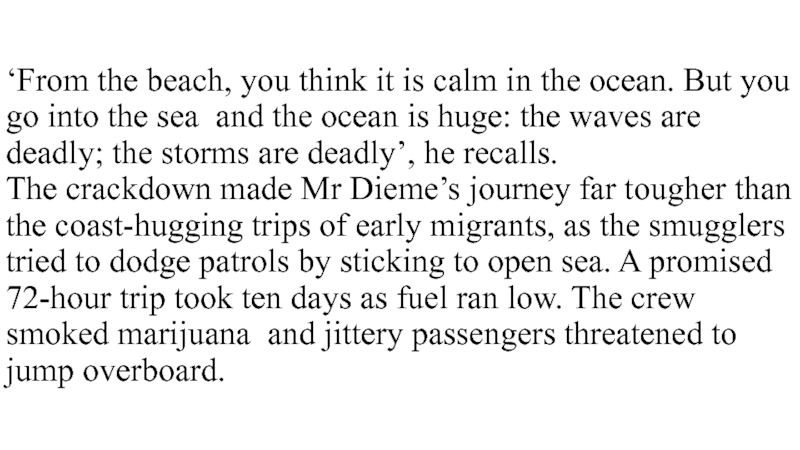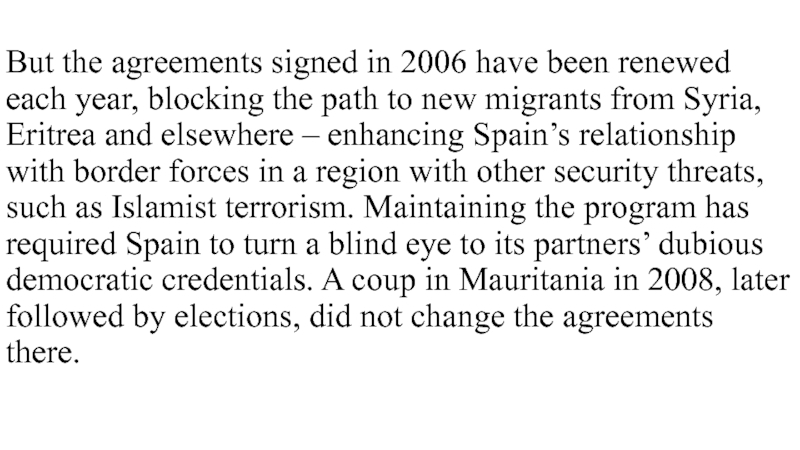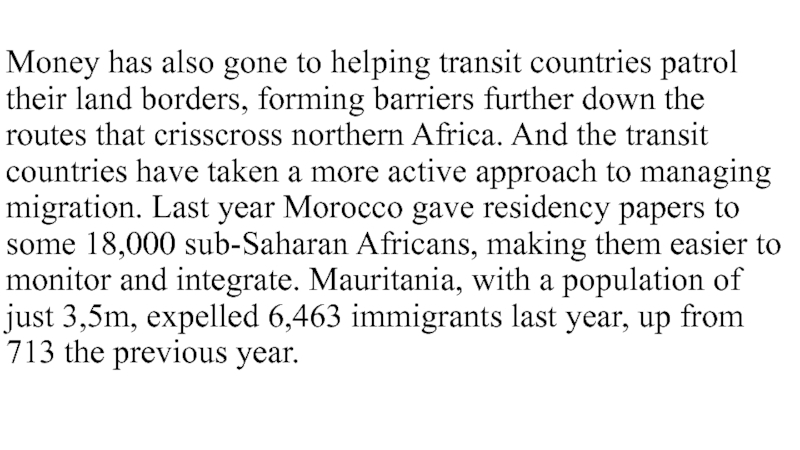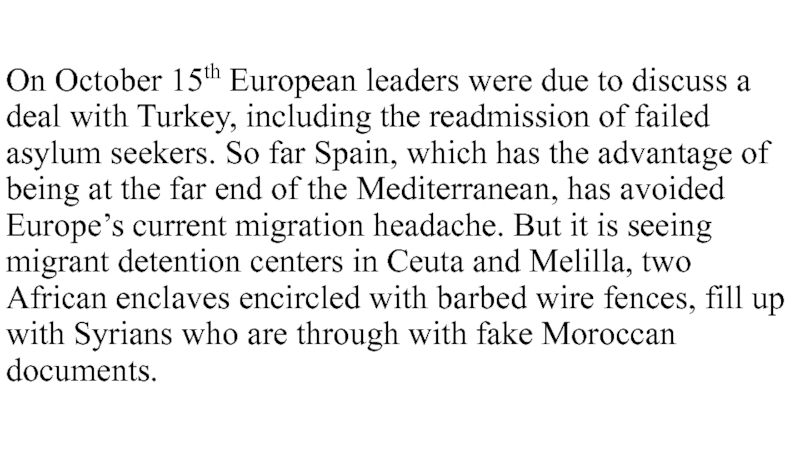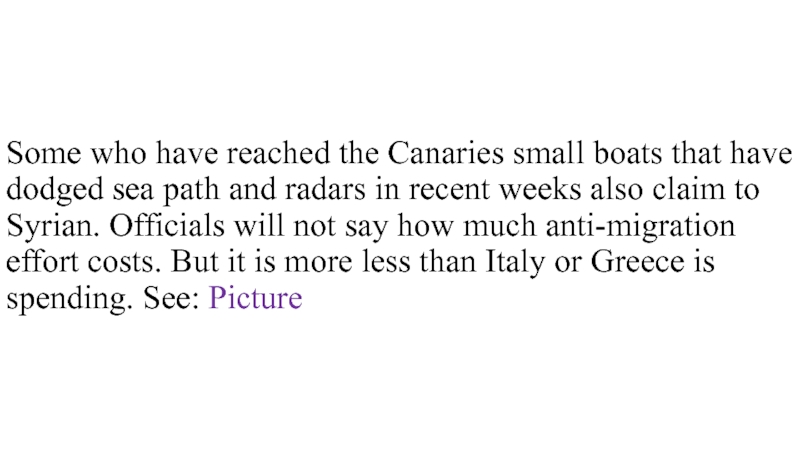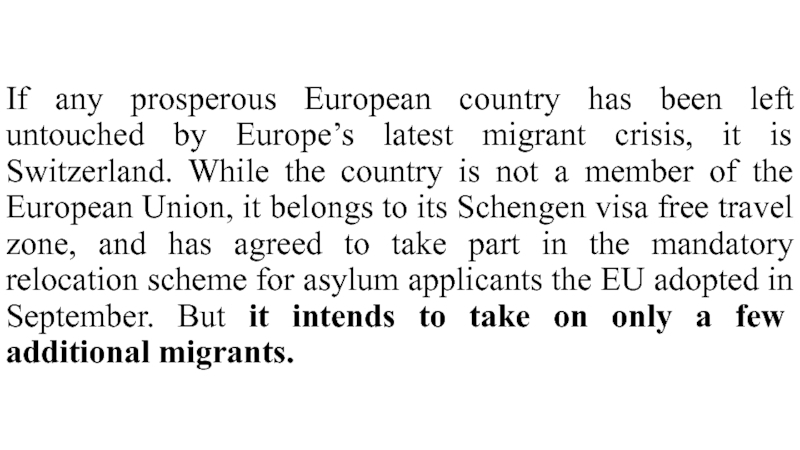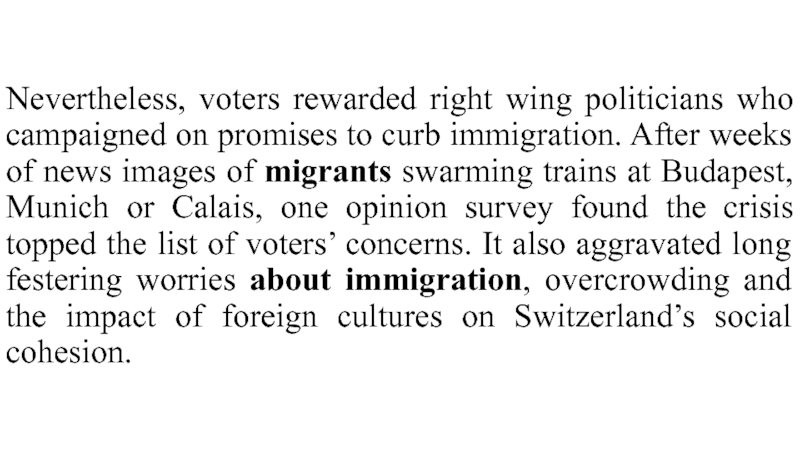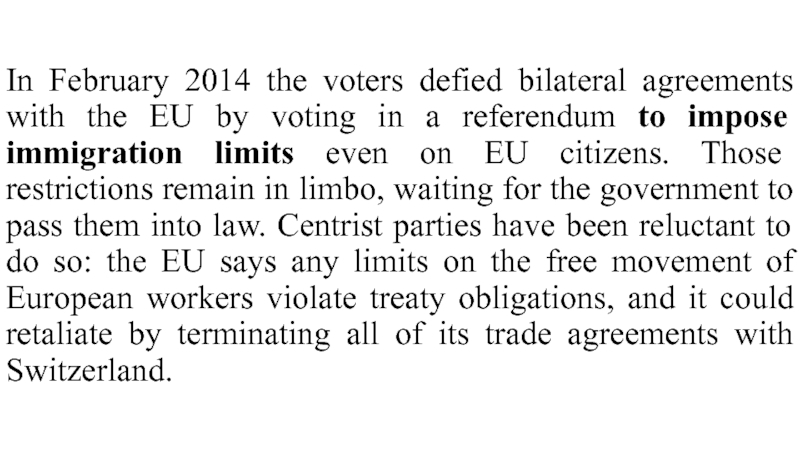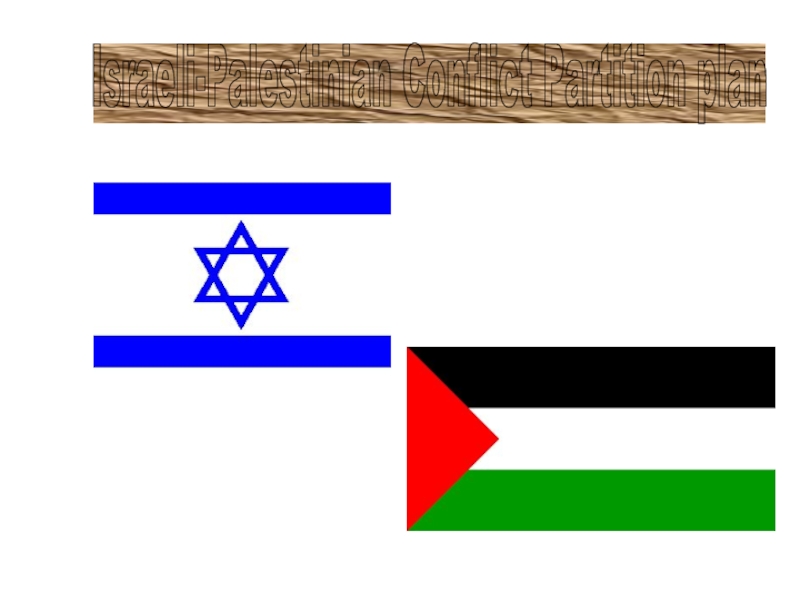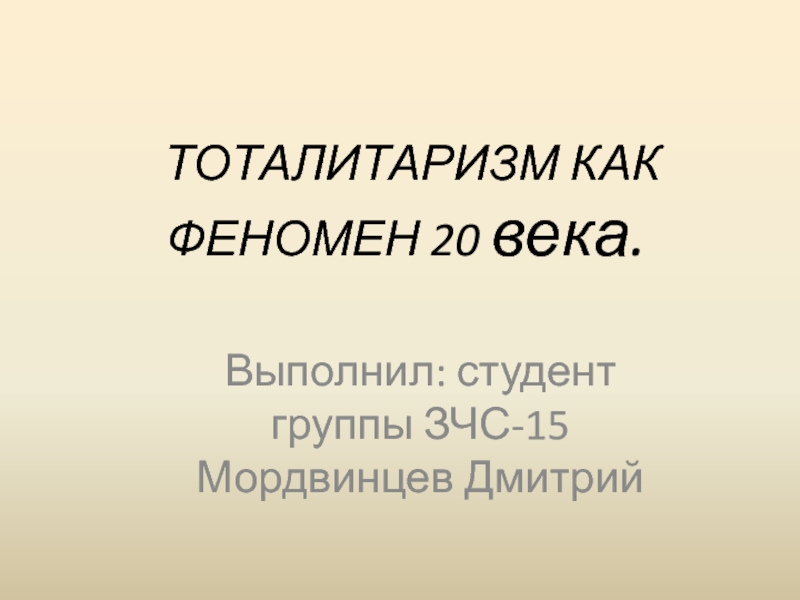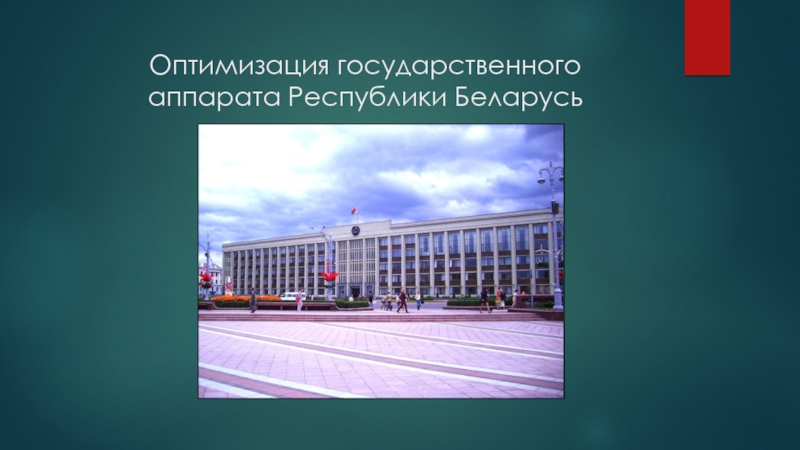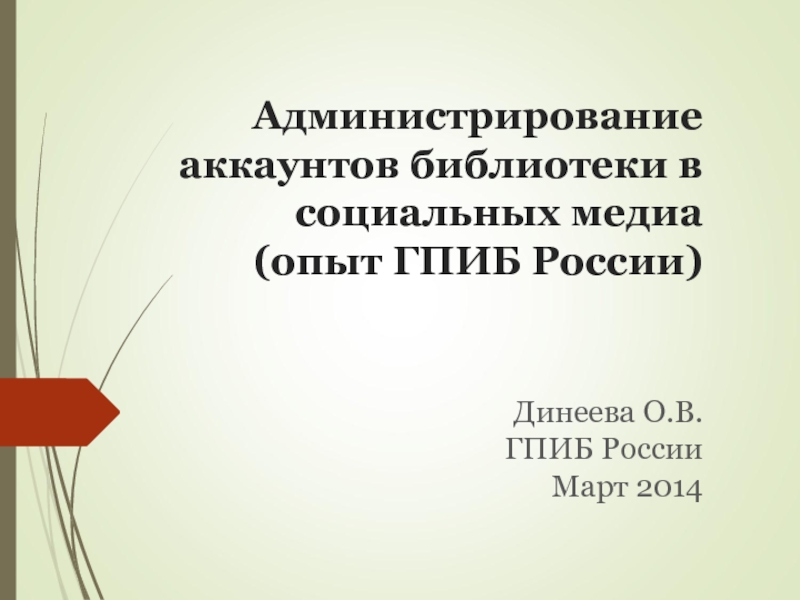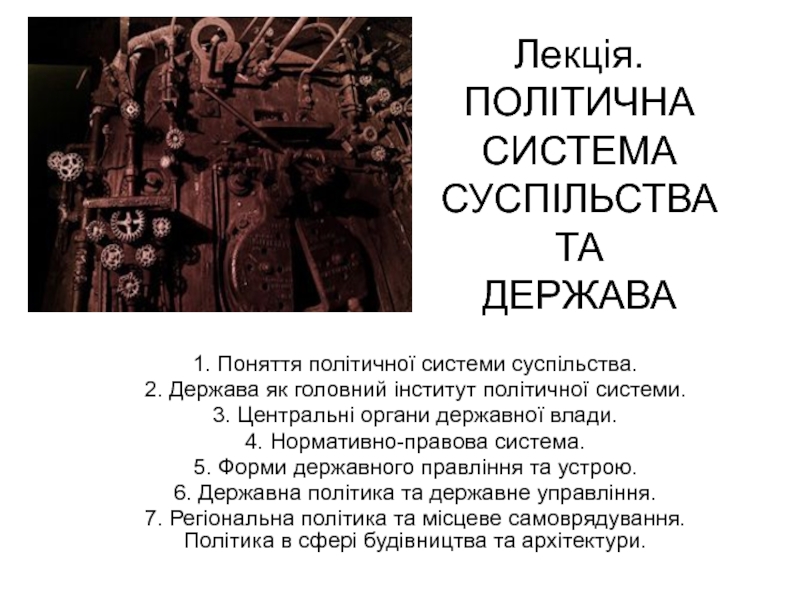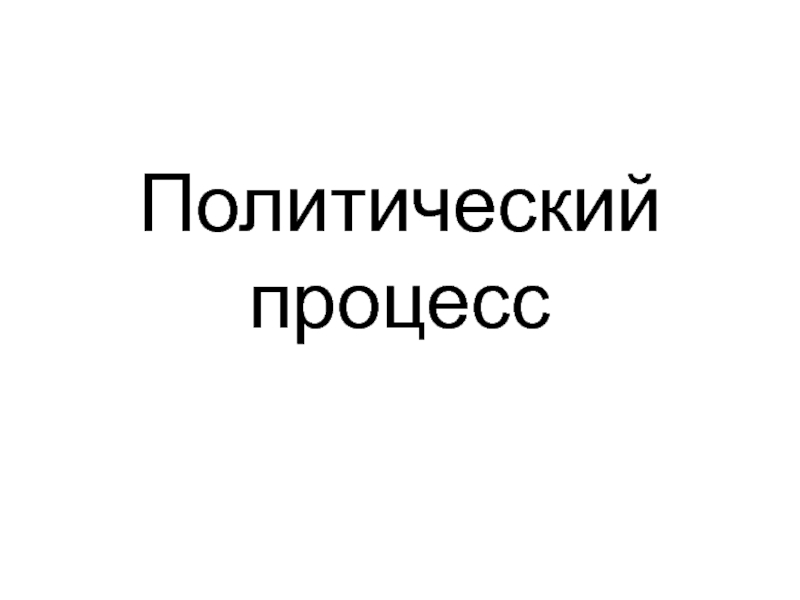migrants?
2. What other Europeans can learn from Spanish efforts to limit illegal migration?
3. Fear of refugees swings Switzerland even farther right.
- Главная
- Разное
- Дизайн
- Бизнес и предпринимательство
- Аналитика
- Образование
- Развлечения
- Красота и здоровье
- Финансы
- Государство
- Путешествия
- Спорт
- Недвижимость
- Армия
- Графика
- Культурология
- Еда и кулинария
- Лингвистика
- Английский язык
- Астрономия
- Алгебра
- Биология
- География
- Детские презентации
- Информатика
- История
- Литература
- Маркетинг
- Математика
- Медицина
- Менеджмент
- Музыка
- МХК
- Немецкий язык
- ОБЖ
- Обществознание
- Окружающий мир
- Педагогика
- Русский язык
- Технология
- Физика
- Философия
- Химия
- Шаблоны, картинки для презентаций
- Экология
- Экономика
- Юриспруденция
Migration policy of Spain & Switzerland презентация
Содержание
- 1. Migration policy of Spain & Switzerland
- 5. With hundreds of thousands of migrants now
- 6. As a former secretary of state for
- 7. Patrolling the 2,395km of Atlantic
- 8. Poorly paid local police, once easy targets
- 9. Traffickers’ boats are intercepted and
- 10. ‘From the beach, you think it is
- 11. Mr Dieme eventually landed in the Canaries,
- 12. But the agreements signed in 2006
- 13. Money has also gone to helping transit
- 14. Mr. Robles reckons the lessons learned by
- 15. On October 15th European leaders were due
- 16. Some who have reached the Canaries small
- 17. If any prosperous European country has been
- 18. The government of the Alpine country had
- 19. Nevertheless, voters rewarded right wing politicians who
- 20. In February 2014 the voters defied bilateral
Слайд 2 New words: razor wire fence – забор колючей проволоки; patrol – патруль sophisticate –
извращать
radar – радар, радиолокатор
counterpart – копия
hugging – в обнимку
to dodge – изворачиваться
marijuana – марихуана
jittery – пугливый
Слайд 3 foul – фол, столкновение dubious – подозрительный credential – мандат; удост. личности; criss cross
– крест-накрест
expel – изгонять
reckon – рассчитывать; думать
buttressing – поддерживать
shattered – разрушенный
enclaves - анклавы
encircled – окруженный;
Слайд 4 barbed wire – колючая проволока dodge – изворачиваться terrain – территория, местность; hub –
хаб; центр интереса;
to curb – бордюрный камень;
swarming – копошиться
aggravate – обострять
festering – мучиться
cohesion – сцепление; связь
to impose – навязать.
Слайд 5With hundreds of thousands of migrants now arriving elsewhere in Europe,
that sounds magical. “Spain has accumulated experience that no other country has”, says Carmen Gonzalez, a migration specialist at the country’s National Distance Education University. But can that experience be applied to today’s surge?
The secret of Spain’s success was co-operation with transit countries such as Senegal, Morocco and Mauritania, says Gonzalo Robles, the government’s aid agency.
Слайд 6As a former secretary of state for immigration, Mr Robles drew
up agreements that helped block Morocco as a departure point both for the Canaries and Gibraltar. They included joint maritime patrols backed up by a sophisticated radar system that could detect boats leaving Morocco’s Mediterranean coast, just nine miles away from Spain at its closest, and tip off police.
Слайд 7 Patrolling the 2,395km of Atlantic coastline shared by Senegal, Mauritania and
the Moroccan-run Western Sahara (not to mention Morocco’s own, long stretch) is a task of another order. But the aim is still to catch boats as they leave. Spain has achieved this with only a few dozen of its own frontier police deployed in Africa. Most work is done by local police, who receive Spanish money, equipment and training. ‘A trained officer can always spot a migrant boat’, says Nicolas Meca, the Spanish police commissioner in charge of the operation in Senegal.
Слайд 8Poorly paid local police, once easy targets for traffickers’ bribes, now
receive daily allowances from Spain when on migration watch. 30 meter patrol boats operated by Spain’s Civil Guard police, or donated to their Senegalese and Mauritanian counterparts, are maintained with Spanish money. And a Spanish helicopter with Senegalese police on board watches from the air. A generous development aid program has bought additional goodwill.
Слайд 9 Traffickers’ boats are intercepted and forced back to shore. Though migrants
are rarely arrested in Senegal, their stories of failure and wasted money spread quickly, stemming the flow. One of the few to get through in the early days of the crackdown was 31 year old Ibrahima Dieme, whose pirogue slipped secretly out of Hann carrying 75 migrants from several African countries. The experience was terrifying and pointless.
Слайд 10‘From the beach, you think it is calm in the ocean.
But you go into the sea and the ocean is huge: the waves are deadly; the storms are deadly’, he recalls.
The crackdown made Mr Dieme’s journey far tougher than the coast-hugging trips of early migrants, as the smugglers tried to dodge patrols by sticking to open sea. A promised 72-hour trip took ten days as fuel ran low. The crew smoked marijuana and jittery passengers threatened to jump overboard.
Слайд 11Mr Dieme eventually landed in the Canaries, but fell foul of
Spain’s repatriation agreement with Senegal. After spending over two weeks in detention, he was sent home with some money, a sandwich and a bottle of water. The roughly $900 he gave the traffickers in 10 times the monthly salary he now earn
helping young people find work.
Spain’s economic crash in 2008 further put job-seeking migrants off. With sea borne migration close to zero and a swelling budget deficit, Spain could have shut the operation down.
Слайд 12 But the agreements signed in 2006 have been renewed each year,
blocking the path to new migrants from Syria, Eritrea and elsewhere – enhancing Spain’s relationship with border forces in a region with other security threats, such as Islamist terrorism. Maintaining the program has required Spain to turn a blind eye to its partners’ dubious democratic credentials. A coup in Mauritania in 2008, later followed by elections, did not change the agreements there.
Слайд 13Money has also gone to helping transit countries patrol their land
borders, forming barriers further down the routes that crisscross northern Africa. And the transit countries have taken a more active approach to managing migration. Last year Morocco gave residency papers to some 18,000 sub-Saharan Africans, making them easier to monitor and integrate. Mauritania, with a population of just 3,5m, expelled 6,463 immigrants last year, up from 713 the previous year.
Слайд 14Mr. Robles reckons the lessons learned by Spain can be applied
elsewhere. Wide ranging bilateral agreements that cover policing, aid and the buttressing of state institutions in transit countries are, he says, the key to success. But economic migration from Africa and a flood of refugees from war-torn countries such as Syria are very different. So, too, is dealing with a shattered state like Libya.
Слайд 15On October 15th European leaders were due to discuss a deal
with Turkey, including the readmission of failed asylum seekers. So far Spain, which has the advantage of being at the far end of the Mediterranean, has avoided Europe’s current migration headache. But it is seeing migrant detention centers in Ceuta and Melilla, two African enclaves encircled with barbed wire fences, fill up with Syrians who are through with fake Moroccan documents.
Слайд 16Some who have reached the Canaries small boats that have dodged
sea path and radars in recent weeks also claim to Syrian. Officials will not say how much anti-migration effort costs. But it is more less than Italy or Greece is spending. See: Picture
Слайд 17If any prosperous European country has been left untouched by Europe’s
latest migrant crisis, it is
Switzerland. While the country is not a member of the European Union, it belongs to its Schengen visa free travel zone, and has agreed to take part in the mandatory relocation scheme for asylum applicants the EU adopted in September. But it intends to take on only a few additional migrants.
Слайд 18The government of the Alpine country had planned to admit about
29,000 asylum seekers in 2015. Over the summer, as hundreds of thousands of refugees surged through the Balkans into neighboring Austria and Germany, Switzerland expanded that estimate – but only to about 30,000. The country’s mountainous terrain and lack of major rail hubs seem to have kept it off the major migrant routes.
Слайд 19Nevertheless, voters rewarded right wing politicians who campaigned on promises to
curb immigration. After weeks of news images of migrants swarming trains at Budapest, Munich or Calais, one opinion survey found the crisis topped the list of voters’ concerns. It also aggravated long festering worries about immigration, overcrowding and the impact of foreign cultures on Switzerland’s social cohesion.
Слайд 20In February 2014 the voters defied bilateral agreements with the EU
by voting in a referendum to impose immigration limits even on EU citizens. Those restrictions remain in limbo, waiting for the government to pass them into law. Centrist parties have been reluctant to do so: the EU says any limits on the free movement of European workers violate treaty obligations, and it could retaliate by terminating all of its trade agreements with Switzerland.

